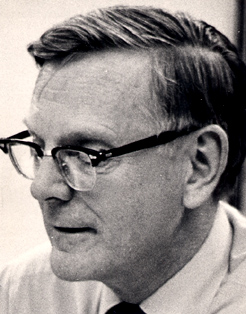

Carl retired two years before his wife, who was three years his junior. The time of retirement was in part the result of planing for opportunities Bernice's job offered the couple.During the last years of her working life, The American Association of Nurse Anesthetists sent Bernice to conference throughout the U.S. and to several other countries. She attended meetings, seminars, gave demonstrations of new techniques, talked to students, and took notes on developments in anesthesia developed elsewhere. Carl could go along with her on these trips, transforming them from hum-drum assignments into grand tours.
The couple enjoyed sight-seeing wherever they went. Bernice found satisfaction in peer recognition and in opportunities to demonstrate her abilities. While Bernice was busy with conferences and classes, Carl found plenty to do. This could be as simple as seeing where public transportation might get him in such cities as New Orleans and San Francisco.
The important trips, however, were more complex. In Japan, the couple spent time and made important contacts through Carl's niece Kris, daughter of his brother Harold, who had taken up residence in that country to pursue her work as an artist.
Two trips to the Soviet Union had special significance for Carl. This was a time when religious intolerance was waning in the U.S.S.R., but had not disappeared. Carl visited Christian and Jewish groups and individuals to do what he could to improve their morale. During WWII, Carl had been horrified by Russian troops pretending to be Germans so they could surrender to the American army, since Stalinist totalitarianism had shown that they could be as easily punished for winning as for losing the war. As in his earlier return to Germany, seeing improvements in the conditions of Russians was important to him. And most important of all was reaffirming his belief that the people of the world wanted to live in peace and harmony, no matter what messes governments, dogmas, ideologies, even religions could make. At the same time, he and Bernice were impressed by the Russian people's resourcefulness, abilities to make the best of what they had, and the high professional status of women, partially brought about by the continuing gender imbalance left by the huge troop losses of WWII. Aside from all such considerations, if you simply take a look at anything from a PBS documentary to movies such as Dr. Zhivago, it's obvious that Russia and its neighbors provide some of the best landscape for sight-seeing in the world.
Carl with Japanese farm couple.
After returning from the U.S.S.R., Carl spoke at Russian-American churches and other organizations, where people often continued the customs of their ancestral lands and tried to maintain contacts with those who still lived in them.
In the late 1980s - early 1990s, Carl staid closer to home. He met regularly with other retired teachers. Their activities included a lot of reminiscing, but many had been active members of the Teachers' Union, as had Carl, and some of their efforts went to strengthening this and other faltering unions.Carl's son worked in Milwaukee at least two days a week at the end of the 8os, and Carl went with him, meeting some of Karl, Jr.s diverse friends and colleagues or checking out sights in the city. The two developed a conversational habit during these years. In the early 1990s, the two spent several hours a day driving simply to engage in "guy talk," interspersed with discussions of everything from history to theology. For father and son, this was a time of family bonding at phases in both their lives that few people get. Much of Carl's biography in this web site comes from these conversations.
Karl, Jr. had many visitors from around the country and the world during the early 1990s, and Carl, Sr. eagerly awaited the opportunity to meet his son's guests, whether they be from California or Scotland, New York or Japan, Illinois or Australia. For several years, a tour of the garden and super with Carl and Bernice was an essential part of however long Karl Jr.'s visitors stayed in Kenosha, and however much of their conversations and working collaborations took part in Karl's apartment. Carl saw these visits as echoes of his travels. The stream of visitors was greatly decreased when AMTRAK ceased making stops in Kenosha. This was a great loss for Carl as well as his son.
By the time of the couple's 50th wedding aniversary in 1996, their health had declined and their traveling days were long over. This didn't mean that Carl had not had plenty to do in the mid 1990s. For the first time in his life, he had enough time to read as much as he wanted. He tended his backyard garden and did light wood working in his basement shop. Expanded television coverage of politics, particularly broadcasts of sessions of congress, gave him the opportunity to watch at least one branch of government function in detail. He kept a copy of the U.S. Constitution tucked in his chair. Although he could recite it verbatim, he also kept a copy of the Bill of Rights on the table next to him. Carl and Bernice celebrating their 50th Wedding Aniversary
Carl ceased attending church during the decade, but this hardly meant ceasing observances. After supper, he and Bernice spent approximately two hours a day in prayer. At times they divided this between petitionary, contemplative, and laudatory (to use the ecclesiastical terms for requests, meditations, and praise). At times the sessions including reading of scripture; at others, silent observance.